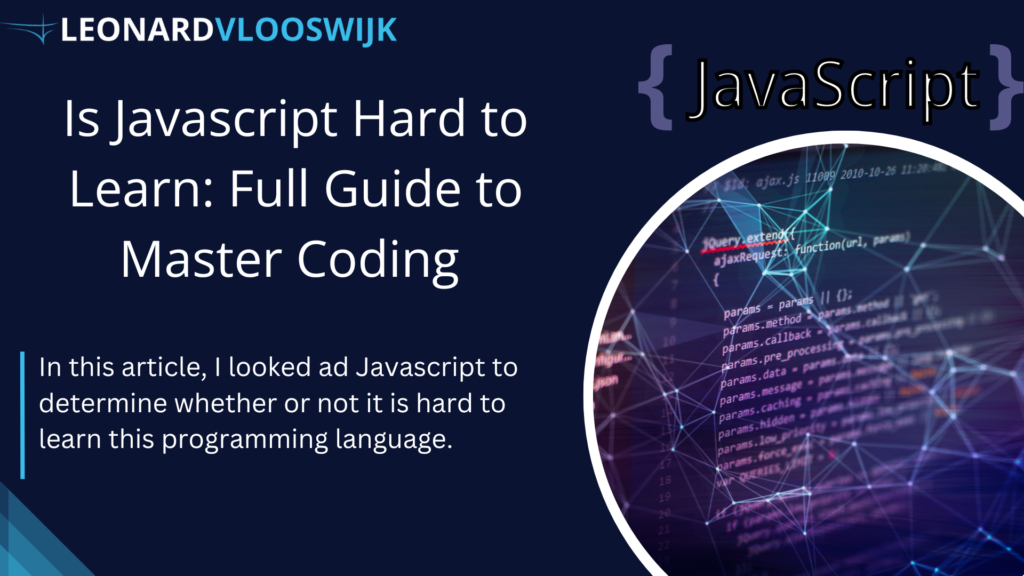Starting to learn a new way of coding can be exciting but sometimes a bit confusing.
If you’re wondering, “Is JavaScript hard to learn?” or just want some good advice, you’re in the right spot.
This guide is here to help you understand the basics, give you useful tips, and answer common questions about learning JavaScript.
Whether you’re new to coding or want to learn more, let’s dive into the world of JavaScript—a language that not only makes websites dynamic but also opens doors to lots of opportunities in coding.
Let’s get right into it.
What is Javascript?

JavaScript, often known as JS, is a versatile programming language that plays a pivotal role in modern web development. It is an essential component for creating dynamic and interactive content on websites, enhancing the user experience by enabling real-time updates and seamless interactions.
Key Features of JavaScript:
- Versatility: JavaScript is not confined to web browsers alone. It is increasingly utilized for server-side development (Node.js) and mobile app development (React Native, NativeScript), making it a full-stack language.
- Object-Oriented: JavaScript employs an object-oriented programming (OOP) paradigm, where code is organized into reusable objects and functions, facilitating efficient and modular development.
- Event-Driven: One of JavaScript’s strengths lies in its ability to respond to events, such as user clicks or data input, enabling the creation of responsive and interactive web applications.
In the context of web development, JavaScript works seamlessly with HTML (Hypertext Markup Language) and CSS (Cascading Style Sheets). While HTML structures content and CSS styles it, JavaScript adds functionality, making websites more than static pages. The trio of HTML, CSS, and JavaScript forms the backbone of modern web development, collectively known as the “frontend.”
Why Should You Learn Javascript?
JavaScript is the backbone of modern web development, offering versatility and a host of benefits. If you’re not sure whether to learn it, my answer is yes, just give it a try.
JavaScript operates across major browsers, empowering developers to create engaging user interfaces.
Originally confined to frontend development, it has evolved to the server-side and mobile app development, making it a full-stack tool.
With frameworks like React Native, it extends its reach to iOS and Android platforms, enhancing its value.
JavaScript’s vast ecosystem, including libraries and frameworks, simplifies tasks and boosts productivity. Plus, Its high demand in the job market, coupled with strong community support, makes it a rewarding language to master.
In essence, learning JavaScript opens doors to a dynamic and versatile skill set, offering a pathway to a fulfilling career in web development.
Is Javascript hard to learn?
The question ‘Is Javascript hard to learn’ largely depends on your existing skill set, but in general, it’s considered relatively easy.
If you’re already familiar with programming concepts or have some experience in coding, picking up JavaScript can be even easier.
Its syntax is user-friendly, resembling plain English, and it offers instant feedback, allowing you to see results quickly.
Additionally, the abundance of learning resources, interactive tutorials, and a supportive community make the journey of learning JavaScript accessible and enjoyable for beginners.
Overall, while individual experiences may vary, many find JavaScript to be an approachable language, especially for those taking their first steps into the world of programming.
Best Way To Learn Javascript
Now that you know the answer to the question ‘Is Javascript hard to learn’, you’ll probably want to know where to start. There are different ways to learn Javascript, but here are the easiest:
Learning Javascript through a Course

In my opinion, the best and fastest way to learn a programming language like Javascript is to follow an online course (See my Best Java Courses list). Java courses give you easy-to-follow steps and give you the knowledge you need.
Learning JavaScript through a structured course can provide a guided and effective approach. Follow these steps to make the most of your learning journey:
1. Choose the Right Course:
Select a reputable JavaScript course on platforms like Udemy, Codecademy, or Coursera. Look for courses with positive reviews and a curriculum aligned with your learning goals. (Check out my Best Javascript Courses article to see which ones).
2. Check Prerequisites:
Ensure you meet any prerequisites for the course. Basic knowledge of HTML and CSS is often recommended. If you’re new to web development, consider introductory courses first.
3. Set Clear Goals:
Define your learning objectives. Whether it’s building a portfolio or gaining skills for a specific job, having clear goals will keep you focused throughout the course.
4. Follow the Structured Curriculum:
Progress through the course in the recommended sequence. Understand each concept before moving on to more advanced topics. Courses are designed to build your knowledge progressively.
5. Complete Exercises and Projects:
Engage in practical exercises and projects provided by the course. Hands-on experience is crucial for reinforcing learning and developing practical coding skills.
6. Engage with the Course Community:
Participate in course forums or communities. Ask questions, share experiences, and learn from others. Engaging with the community enhances your understanding and provides valuable insights.
7. Practice Regularly and Seek Feedback:
Dedicate regular time to coding exercises. Apply what you’ve learned to solve problems and reinforce concepts. If the course offers feedback opportunities, take advantage of them to improve your coding skills.
By following these seven steps, you can make the most of your JavaScript course, ensuring a structured and effective learning experience.
Learning Javascript Through Interactive Coding Platforms

You can also learn Java by practicing and learning on coding platforms. Platforms like Codecademy and freeCodeCamp offer hands-on exercises that provide immediate feedback, facilitating a learn-by-doing approach. (See my FreeCodeCamp VS CodeCademy article to see which one’s better).
Structured learning paths guide beginners through progressively challenging lessons, complemented by real-world projects and coding challenges.
The interactive nature extends to community features, fostering collaboration with fellow learners and instructors.
With flexibility, progress tracking, and achievement badges, these platforms make JavaScript learning accessible and rewarding, plus they are free to use.
The emphasis on practical application ensures a seamless transition to real-world coding scenarios, preparing learners for the challenges of JavaScript development with a comprehensive skill set.
Learn Javascript Through A Book
Learning JavaScript through a book offers a structured and in-depth approach to coding education. These books, crafted by experienced authors, provide a carefully sequenced learning path from fundamental concepts to advanced topics, fostering a deep understanding of the language.
With hands-on exercises and projects, readers can actively engage with the material, solidifying their skills. The permanence of a book, whether in physical or digital form, serves as a reliable offline reference, complementing online resources.
Whether exploring specialized topics or seeking to understand core principles, learning JavaScript through a book remains a versatile and effective method for coding enthusiasts.
Now that you know how to learn Javascript, let’s take a look at what some of the best Javascript courses are.
Best Javascript Courses

When you’re starting to learn JavaScript, it’s important to have good guidance, and choosing the best courses is crucial for success. Here is a sneak peak of my best Java courses list:
1. “Java 17 Masterclass: Start Coding in 2023” on Udemy:
Created by Tim Buchalka, this course is designed for learners looking to master Java coding in 2023. The course includes approximately 135 hours of video content.
2. “Learn JAVA Programming – Beginner to Master” on Udemy:
Crafted by Abdul Bari, this course is ideal for those starting from scratch and aiming to become Java masters. The course spans approximately 61 hours of video content.
3. “Java Programming for Complete Beginners” on Udemy:
Developed by In28minutes, this course is tailored for absolute beginners in Java programming. The course comprises approximately 40 hours of video content.
For the complete list of best Java courses, including detailed insights and recommendations, visit my article on the best Java courses. Explore a curated selection of courses to enhance your Java programming skills and stay ahead in the dynamic world of coding.
Best Javascript Jobs: What Jobs Can You Get With Javascript?

JavaScript proficiency opens up a plethora of job opportunities in the dynamic field of web development and beyond. Here’s a short guide to the diverse jobs you can secure with JavaScript skills:
1. Frontend Developer:
As a frontend developer, you’ll leverage JavaScript to build visually appealing and interactive user interfaces on websites. Frameworks like React, Angular, and Vue.js often come into play.
2. Backend Developer (Node.js):
With Node.js, JavaScript extends its reach to the server-side, allowing you to work as a backend developer. You’ll handle server logic and databases, creating a full-stack development skill set.
3. Full-Stack Developer:
Mastering both frontend and backend development makes you a full-stack developer. You’ll be capable of handling all aspects of web application development, offering a comprehensive skill set to employers.
4. Mobile App Developer:
JavaScript, coupled with frameworks like React Native or NativeScript, empowers you to create cross-platform mobile applications for both iOS and Android. Mobile app development becomes accessible with your JavaScript skills.
5. UI/UX Designer:
Understanding JavaScript enhances your collaboration with designers. As a UI/UX designer, you can create prototypes and implement dynamic features to enhance the user experience.
6. Web Development Instructor:
With solid JavaScript expertise, you can venture into teaching. Becoming a web development instructor allows you to share your knowledge and help others embark on their coding journeys.
7. Quality Assurance (QA) Engineer:
QA engineers ensure the functionality and quality of web applications. Knowledge of JavaScript is valuable for creating automated testing scripts and conducting comprehensive testing.
8. DevOps Engineer:
In the DevOps domain, JavaScript is used for automation and scripting tasks. DevOps engineers streamline the development process, and your JavaScript skills can contribute to efficient workflows.
9. Game Developer:
JavaScript, particularly with HTML5 and WebGL, can be used to create browser-based games. Game development roles become accessible as you delve into the world of JavaScript gaming.
10. Technical Support Specialist:
A solid understanding of JavaScript equips you to provide technical support for web applications. Troubleshooting and resolving issues become part of your skill set in a technical support role.
In conclusion, the versatility of JavaScript opens doors to a wide array of career opportunities. Whether you’re drawn to frontend design, backend development, or other tech roles, mastering JavaScript positions you for success in the ever-evolving landscape of the tech industry.
Is learning Javascript worth it?
We answered the question ‘is Javascript hard to learn’, but In the ever-expanding landscape of programming languages, a different question arises: Is learning JavaScript worth it? The easy and straightforward answer to that is a resounding yes, and here’s why:
1. Foundation of Web Development:
JavaScript is the backbone of web development. As a client-side scripting language, it empowers developers to create dynamic and interactive websites, elevating the overall user experience.
2. Versatility Across Tech Stacks:
JavaScript’s versatility extends beyond frontend development. With technologies like Node.js, JavaScript is now a formidable player on the server side, enabling full-stack development and fostering a broader skill set.
3. Vast Ecosystem of Libraries and Frameworks:
JavaScript boasts a rich ecosystem with a plethora of libraries and frameworks like React, Angular, and Vue.js. These tools simplify complex tasks, expedite development, and enhance the efficiency of web applications.
4. High Demand in the Job Market:
The demand for JavaScript skills is consistently high in the job market. Companies seek developers proficient in creating interactive and responsive web applications, making JavaScript a valuable asset in securing diverse job opportunities.
5. Entry Point to Mobile App Development:
JavaScript, combined with frameworks like React Native or NativeScript, opens doors to mobile app development. Learning JavaScript allows developers to create cross-platform mobile applications, reaching both iOS and Android users.
6. Active and Supportive Community:
JavaScript has a vibrant and supportive community. Access to forums, blogs, and online communities ensures continuous learning and collaboration opportunities for developers at all skill levels.
7. Adaptability and Regular Updates:
JavaScript is an ever-evolving language, continuously adapting to industry needs. Regular updates and new features keep it relevant, ensuring that developers stay current in the rapidly changing tech landscape.
8. Gateway to Progressive Web Applications (PWAs):
Java plays a crucial role in building Progressive Web Applications, offering a seamless and app-like experience on the web. This emerging technology aligns with the modern trend of creating responsive and performant web apps.
In conclusion, the investment in learning JavaScript is undoubtedly worthwhile. It forms the foundation of web development, opens doors to tons of job opportunities, and positions developers at the forefront of technological advancements. Whether you’re a beginner or an experienced coder, acquiring JavaScript skills is a strategic move that aligns with the present and future of software development.
Best Tips for Learning Javascript
Here are some of my practical tips to ensure a smooth and effective learning experience:
1. Find a Great Course:
Invest time in researching and selecting a high-quality JavaScript course. Platforms like Udemy, Codecademy, or Coursera offer comprehensive courses with structured content, ensuring a solid learning foundation.
2. Solidify Fundamentals First:
Master the basics—understand variables, data types, and basic syntax. A strong foundation sets the stage for more advanced concepts in JavaScript.
3. Hands-On Practice is Key:
Actively engage with coding exercises and projects to reinforce your understanding. Platforms like Codecademy and freeCodeCamp offer hands-on challenges, allowing you to apply theory to practice.
4. Build Real-World Projects:
Apply your knowledge by working on tangible projects. Start small, and gradually take on more complex tasks. Building real-world applications enhances your skills and boosts confidence.
5. Explore JavaScript Frameworks:
Once you’re comfortable with the basics, delve into popular JavaScript frameworks like React, Angular, or Vue.js. Frameworks streamline development and are widely used in the industry.
6. Seek Feedback and Collaborate:
Join coding communities where you can seek feedback on your code and collaborate with other learners. Actively participating in forums like Stack Overflow enhances your problem-solving skills and broadens your perspective.
By incorporating these tips, including finding a great course, you’ll create a well-rounded learning experience and set yourself up for success in mastering JavaScript.
Wrap Up
So, Is Javascript hard to learn?
Well, in my opinion, learning JavaScript isn’t really hard, its actually quite straightforward.
It’s a language that’s open to everyone, no matter their skill level. By choosing a good Java course, getting the basics right, practicing with real projects, and exploring frameworks, you can make learning JavaScript easier.
It’s a language that powers websites and offers lots of opportunities. So, don’t worry too much—learning JavaScript can be fun and rewarding. Just keep going, and enjoy the journey of coding!
Frequently Asked Questions (FAQ)
1. Is JavaScript hard to learn for beginners?
The simple answer to the question ‘Is Javascript hard to learn’ is: No, JavaScript is beginner-friendly. With the right resources and approach, beginners can grasp its fundamentals and progressively tackle more advanced concepts.
2. How long does it take to learn JavaScript?
The time to learn JavaScript varies, but many beginners become comfortable with its basics in a few weeks. Continuous practice and project work contribute to mastering the language.
3. Do I need prior coding experience to learn JavaScript?
No, JavaScript is a suitable language for beginners. While prior coding experience can be helpful, it’s not a prerequisite for starting to learn JavaScript.
4. What are the best resources for learning JavaScript?
Quality courses on platforms like Udemy, Codecademy, and freeCodeCamp are excellent starting points. (Check Out my Best Java Courses article). Additionally, official documentation and community forums provide valuable support.
5. Is learning JavaScript necessary for web development?
Yes, JavaScript is crucial for web development. It’s the primary language for creating dynamic and interactive websites, enhancing user experiences.
6. How can I practice JavaScript coding?
Practice coding through hands-on exercises on platforms like Codecademy, HackerRank, or LeetCode. Building real-world projects is another effective way to apply and reinforce your JavaScript skills.
7. Which JavaScript frameworks should I learn?
Popular JavaScript frameworks include React, Angular, and Vue.js. The choice depends on your specific goals and the demands of the industry.
8. Can I use JavaScript for mobile app development?
Yes, frameworks like React Native and NativeScript allow you to use JavaScript for mobile app development, creating applications for both iOS and Android platforms.
9. What job opportunities are available with JavaScript skills?
JavaScript skills open doors to various job opportunities, including roles such as frontend or backend developer, full-stack developer, mobile app developer, UI/UX designer, and more.
10. How can I stay updated with JavaScript trends?
To stay updated, follow blogs, newsletters, and social media accounts dedicated to web development. Engage with the JavaScript community on platforms like GitHub and Stack Overflow.

